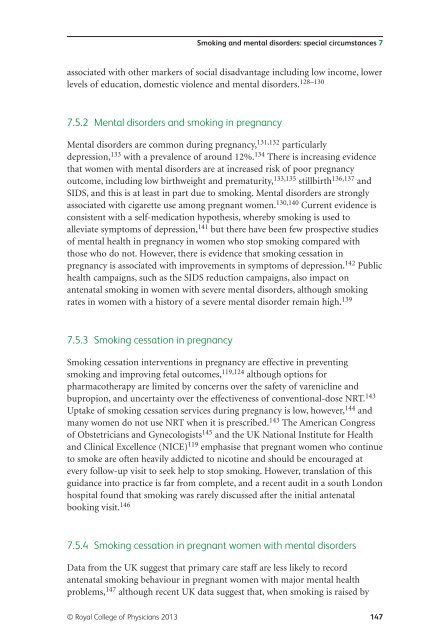Smoking and mental health - NCSCT
Smoking and mental health - NCSCT
Smoking and mental health - NCSCT
You also want an ePaper? Increase the reach of your titles
YUMPU automatically turns print PDFs into web optimized ePapers that Google loves.
<strong>Smoking</strong> <strong>and</strong> <strong>mental</strong> disorders: special circumstances 7<br />
associated with other markers of social disadvantage including low income, lower<br />
levels of education, domestic violence <strong>and</strong> <strong>mental</strong> disorders. 128–130<br />
7.5.2 Mental disorders <strong>and</strong> smoking in pregnancy<br />
Mental disorders are common during pregnancy, 131,132 particularly<br />
depression, 133 with a prevalence of around 12%. 134 There is increasing evidence<br />
that women with <strong>mental</strong> disorders are at increased risk of poor pregnancy<br />
outcome, including low birthweight <strong>and</strong> prematurity, 133,135 stillbirth 136,137 <strong>and</strong><br />
SIDS, <strong>and</strong> this is at least in part due to smoking. Mental disorders are strongly<br />
associated with cigarette use among pregnant women. 130,140 Current evidence is<br />
consistent with a self-medication hypothesis, whereby smoking is used to<br />
alleviate symptoms of depression, 141 but there have been few prospective studies<br />
of <strong>mental</strong> <strong>health</strong> in pregnancy in women who stop smoking compared with<br />
those who do not. However, there is evidence that smoking cessation in<br />
pregnancy is associated with improvements in symptoms of depression. 142 Public<br />
<strong>health</strong> campaigns, such as the SIDS reduction campaigns, also impact on<br />
antenatal smoking in women with severe <strong>mental</strong> disorders, although smoking<br />
rates in women with a history of a severe <strong>mental</strong> disorder remain high. 139<br />
7.5.3 <strong>Smoking</strong> cessation in pregnancy<br />
<strong>Smoking</strong> cessation interventions in pregnancy are effective in preventing<br />
smoking <strong>and</strong> improving fetal outcomes, 119,124 although options for<br />
pharmacotherapy are limited by concerns over the safety of varenicline <strong>and</strong><br />
bupropion, <strong>and</strong> uncertainty over the effectiveness of conventional-dose NRT. 143<br />
Uptake of smoking cessation services during pregnancy is low, however, 144 <strong>and</strong><br />
many women do not use NRT when it is prescribed. 143 The American Congress<br />
of Obstetricians <strong>and</strong> Gynecologists 145 <strong>and</strong> the UK National Institute for Health<br />
<strong>and</strong> Clinical Excellence (NICE) 119 emphasise that pregnant women who continue<br />
to smoke are often heavily addicted to nicotine <strong>and</strong> should be encouraged at<br />
every follow-up visit to seek help to stop smoking. However, translation of this<br />
guidance into practice is far from complete, <strong>and</strong> a recent audit in a south London<br />
hospital found that smoking was rarely discussed after the initial antenatal<br />
booking visit. 146<br />
7.5.4 <strong>Smoking</strong> cessation in pregnant women with <strong>mental</strong> disorders<br />
Data from the UK suggest that primary care staff are less likely to record<br />
antenatal smoking behaviour in pregnant women with major <strong>mental</strong> <strong>health</strong><br />
problems, 147 although recent UK data suggest that, when smoking is raised by<br />
© Royal College of Physicians 2013 147














